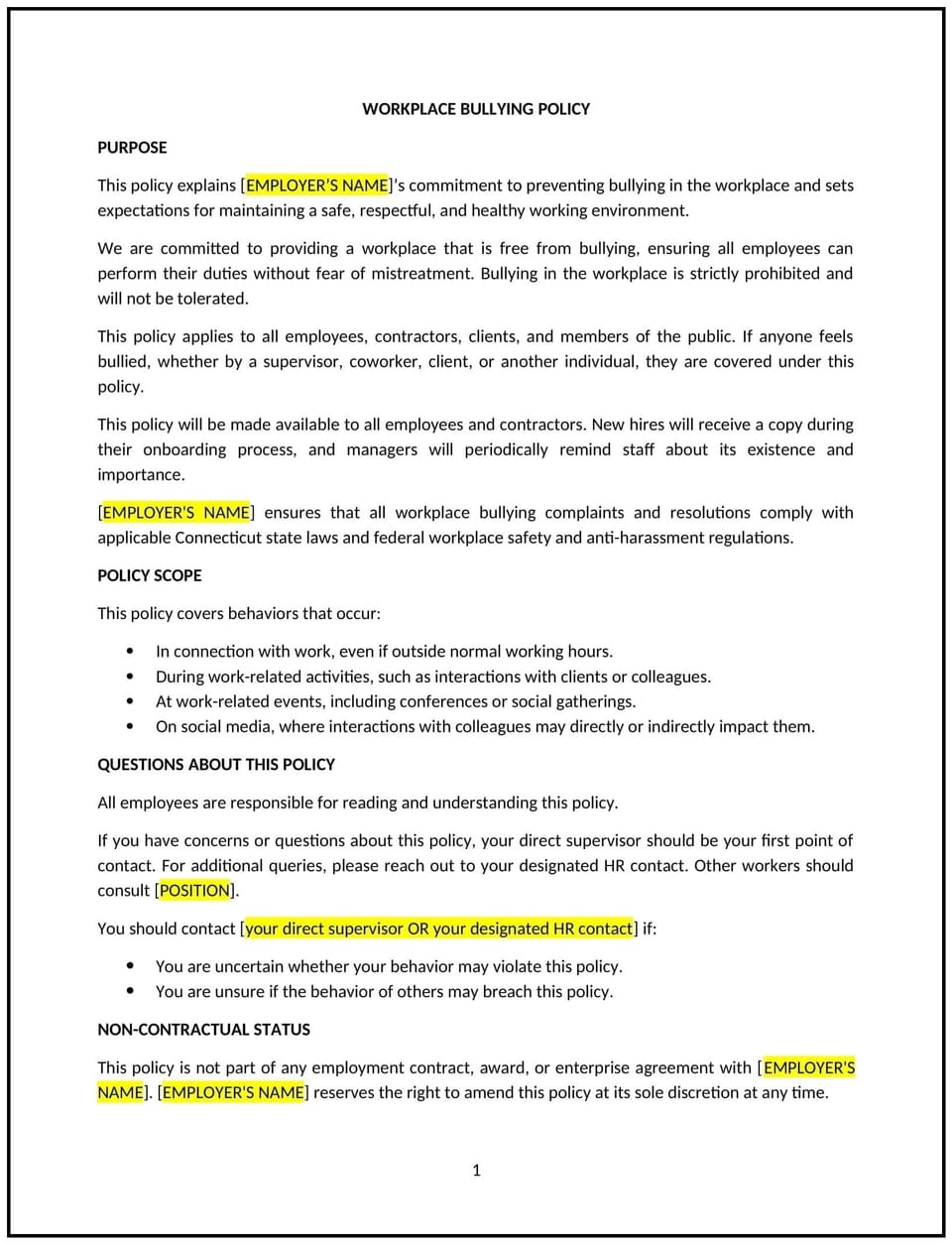Workplace bullying policy (Connecticut): Free template

Workplace bullying policy (Connecticut)
A workplace bullying policy helps Connecticut businesses create a safe and respectful environment by preventing and addressing bullying behaviors. This policy outlines the company’s stance on bullying, defines what constitutes bullying, and provides a framework for addressing complaints, offering support to victims, and enforcing appropriate consequences for offenders.
By implementing this policy, businesses can foster a positive and productive work environment, minimize workplace disruptions, and comply with relevant state laws related to harassment and workplace safety.
How to use this workplace bullying policy (Connecticut)
- Define workplace bullying: Clearly define what constitutes workplace bullying, including physical bullying, verbal abuse, intimidation, exclusion, cyberbullying, or any other actions that create a hostile or abusive work environment.
- Set expectations for behavior: Outline the expected behaviors in the workplace, emphasizing respect, professionalism, and the company’s commitment to preventing bullying.
- Establish reporting procedures: Specify how employees can report bullying incidents, including designated contacts (e.g., HR or managers), the required format for reporting, and the process for investigating claims.
- Protect victims from retaliation: Ensure that employees who report bullying are protected from retaliation, and that their complaints will be taken seriously and handled confidentially.
- Outline the investigation process: Provide a clear and fair process for investigating bullying complaints, ensuring that all parties involved are given the opportunity to be heard and that complaints are addressed promptly.
- Set disciplinary measures: Clearly define the consequences for bullying behavior, including potential disciplinary actions ranging from warnings to termination, depending on the severity of the incident.
- Provide support for victims: Offer resources, such as counseling or employee assistance programs (EAPs), for victims of workplace bullying to help them recover and return to work.
- Promote a culture of respect: Encourage a workplace culture where respect, inclusivity, and professionalism are the norms, and bullying behaviors are actively discouraged and addressed.
Benefits of using this workplace bullying policy (Connecticut)
This policy offers several benefits for Connecticut businesses:
- Promotes a positive workplace culture: By clearly defining acceptable behavior and preventing bullying, the policy helps foster a respectful, inclusive, and professional work environment.
- Reduces legal risks: The policy helps businesses comply with state and federal laws regarding harassment and discrimination, reducing the risk of legal claims and liabilities.
- Improves employee morale: A bullying-free environment boosts employee morale, engagement, and productivity, creating a workplace where employees feel valued and supported.
- Increases retention: By addressing bullying effectively, the policy helps retain talent by ensuring that employees feel safe and respected, reducing turnover due to hostile work environments.
- Enhances workplace productivity: By preventing bullying, businesses reduce distractions, workplace conflict, and absenteeism, leading to improved focus and overall productivity.
Tips for using this workplace bullying policy (Connecticut)
- Communicate the policy clearly: Ensure all employees understand what constitutes workplace bullying and how to report it. The policy should be part of onboarding and regularly reinforced in training sessions.
- Train employees and managers: Provide training on workplace bullying, including how to recognize it, how to respond, and how to foster a respectful work environment.
- Foster an open environment: Encourage open communication and make employees feel comfortable reporting bullying without fear of retaliation. Ensure that all reports are treated with seriousness and confidentiality.
- Regularly review the policy: Regularly review and update the policy to ensure it remains compliant with any changes in Connecticut law and continues to address evolving workplace dynamics.
- Monitor the work environment: Continuously monitor the workplace environment and address any signs of bullying proactively, before it escalates into more serious issues.
Q: How does this policy benefit my business?
A: The policy promotes a positive and respectful workplace, reduces the risk of legal liabilities related to harassment, and enhances employee satisfaction and productivity by ensuring a safe and supportive work environment.
Q: What is considered workplace bullying?
A: Workplace bullying includes any repeated, harmful behavior that creates a hostile work environment, such as verbal abuse, physical intimidation, exclusion, cyberbullying, or any other actions that harm or threaten the dignity of others.
Q: How can employees report workplace bullying?
A: Employees should report bullying to a designated contact, such as HR or a manager, and provide details of the incident(s). The policy should ensure that reports are confidential and handled in a fair and timely manner.
Q: What happens if an employee is found to have engaged in bullying?
A: The policy should specify the disciplinary actions that may result from bullying, such as warnings, suspension, or termination, depending on the severity of the incident. All complaints will be investigated fairly, and appropriate action will be taken.
Q: How does the company protect employees who report bullying?
A: The policy ensures that employees who report bullying are protected from retaliation. Employees will be encouraged to report incidents, knowing that their concerns will be taken seriously and addressed confidentially.
Q: How often should this policy be reviewed?
A: The policy should be reviewed annually or whenever there are updates to Connecticut laws, federal regulations, or company practices to ensure it remains effective, compliant, and aligned with company values.
This article contains general legal information and does not contain legal advice. Cobrief is not a law firm or a substitute for an attorney or law firm. The law is complex and changes often. For legal advice, please ask a lawyer.


